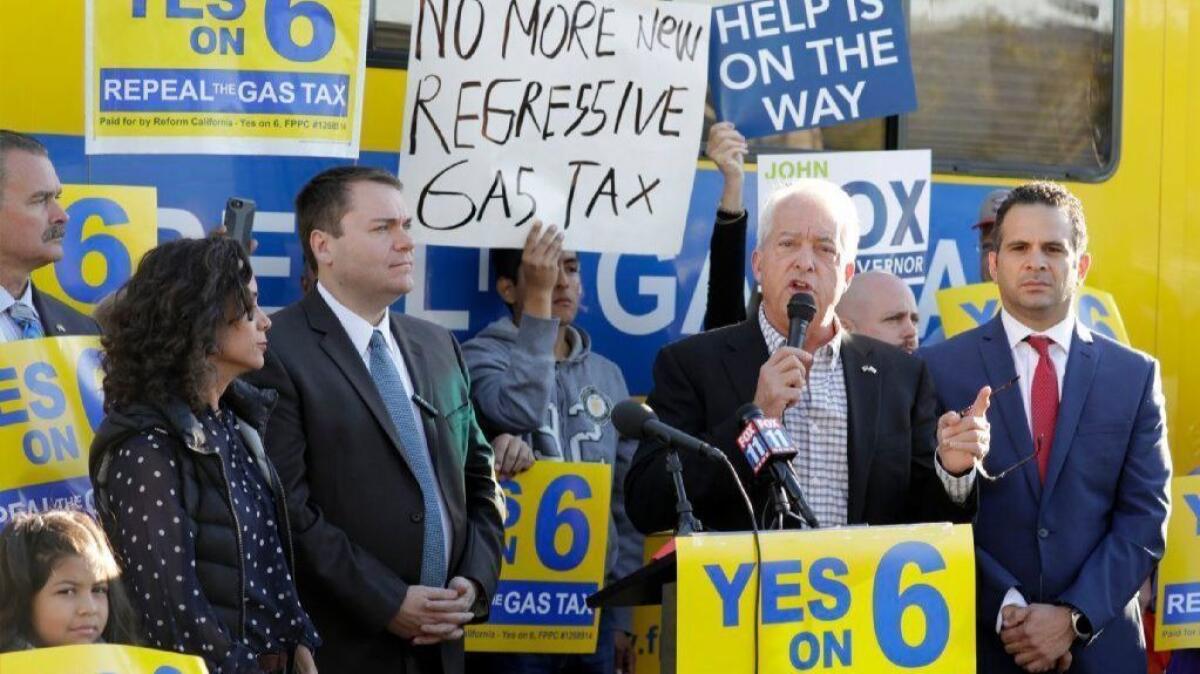Capitol Journal: The campaign to repeal California’s gas tax increase is sputtering. That’s because voters don’t know about it

- Share via
Reporting from Sacramento — Republican politicians placed a repeal of a gas tax increase on the ballot to attract conservative voters and save GOP congressional seats. So how’s that going?
We won’t know for sure until election day. But right now it seems iffy.
The thought a year ago was that a half-dozen or more Republican-held U.S. House seats in California would be fierce battlegrounds this fall — and they are. Republican voters needed extra incentive to cast ballots, it was theorized. If Democrats flipped 23 GOP seats nationwide, they’d recapture the House.
“The base vote needs some motivation,” veteran Republican consultant Dave Gilliard told me. “Democrats handed us a gift by passing this very unpopular [gas tax] bill and we should take advantage of it.”
Gilliard was running an embryonic campaign to repeal the gas tax hike that had been passed by the Legislature and eagerly signed by Gov. Jerry Brown.
The legislation raised the gas tax by 12 cents a gallon and diesel by 20 cents. It imposed a new annual vehicle fee, ranging from $25 to $175 depending on a car’s worth. And there was a $100 annual fee on electric cars that don’t burn gas.
All that raises about $5.2 billion a year — 65% of it for road and bridge repairs, 20% for transit, some for better truck access around ports and a bit for bicycle and pedestrian lanes.
That looked like a fat target for Republican pols eager to increase GOP voter turnout. Republican House members and the party poured big bucks into a signature-collecting drive to qualify the initiative for the Nov. 6 ballot. It became Proposition 6.
House Majority Leader Kevin McCarthy of Bakersfield put up $300,000. Republican Rep. Mimi Walters of Laguna Beach, in a tight reelection race, contributed $135,000. Republican gubernatorial candidate John Cox, chairman of the repeal committee, ponied up $250,000. The California Republican Party gave $465,000.
Those and other large GOP donations got the measure on the ballot. But once there, funding dried up. Party pols apparently don’t really care whether the repeal passes. They just want to use it as a shiny lure for anti-tax voters.
So is it attracting voters?
“Yes, absolutely,” Gilliard says. “In districts where there are Republican voters, it’s bringing out non-high-propensity voters.
“All our candidates are trying to tell voters what Proposition 6 is. They’re running on the issue.”
Their problem, however, is that there isn’t enough money for Proposition 6 TV ads. Just talking about it isn’t reaching many people.
Coverage of California politics »
“The idea of this being a motivator only works if people know about it. And right now they don’t know about it,” says veteran Republican consultant Richard Temple. “There’s no ‘yes’ campaign to tell them it’s on the ballot.
“The problem in California is that voters are not much aware of anything. They’re either disengaged and living their lives, or totally locked into D.C. politics. I don’t hear a lot of people talking about candidates or state measures. If they’re talking politics, it’s national politics.”
And if they’re extra motivated, it’s probably because of the U.S. Senate’s recent partisan brawl over Judge Brett M. Kavanaugh’s Supreme Court confirmation.
Longtime Democratic strategist Garry South scoffs at the notion that Republican voters need any added incentive to cast ballots.
“It’s not Republicans who don’t vote,” he says. “It’s a historical fact that Republicans are very reliable voters. It’s why they sometimes clean our clock in non-presidential years. It’s Democrats who need a Bunsen burner under their butts to get them out to vote.”
“I’ve been around California since 1991,” South adds, “and the only ballot measure that drove turnout was 187.”
Proposition 187 was the 1994 initiative that sought to deny public services to immigrants living here illegally. It passed overwhelmingly but was overturned by a court. It helped Republicans pile up big victories in California that year, including a rare takeover of the Assembly. But 187 backfired on the GOP by alienating the fast-growing Latino population. And the party hasn’t recovered.
Although guilty of hyperbole, Proposition 6 backers are right about one thing: The state has been using highway money for questionable things — especially Brown’s problematic bullet train.
Beginning in 2010, at the height of the recession when the state budget was hemorrhaging billions of dollars, the Legislature and then-Gov. Arnold Schwarzenegger began using truck weight fees to pay off transportation bonds. The vast majority of those bonds financed highway and bridge repairs, a good use of truck fees. But one set of bonds helped fund the high-speed rail project.
That’s a bad use. Truck weight fees should be used solely for repairing highway damage caused by trucks.
Instead, nearly $1.8 billion worth has been spent on bullet train bonds. The rationale is that high-speed rail is a transportation project, just as bridge repair is. OK, but the bullet train shouldn’t be funded by highway fees. Bad policy. Terrible PR.
That said, California needs to fix its crumbling roads. There’s a massive $130-billion backlog in maintenance. This has to be paid for by motorists. The only realistic way is to keep those slightly higher fuel taxes and registration fees.
A ballot measure passed in June locks up the revenue solely for transportation projects — and prevents its use on bullet train bonds.
The anti-Proposition 6 campaign is loaded with money from unions and road-builders.
Polls show the proposition is sputtering.
So are some endangered Republican House members.
Follow @LATimesSkelton on Twitter
More to Read
Get the L.A. Times Politics newsletter
Deeply reported insights into legislation, politics and policy from Sacramento, Washington and beyond. In your inbox three times per week.
You may occasionally receive promotional content from the Los Angeles Times.











